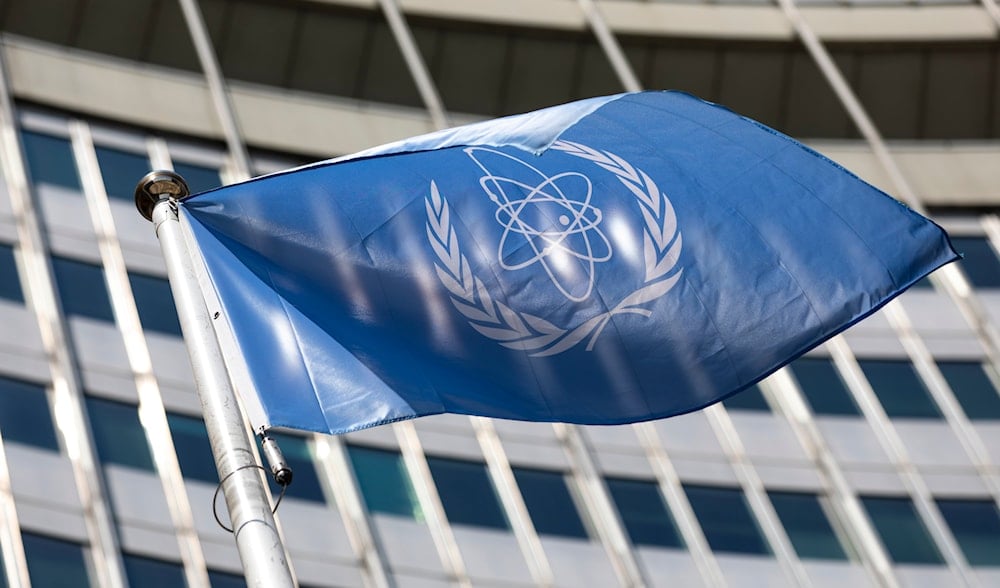IAEA's return does not signal full resumption of cooperation: Iran
Tehran confirms IAEA inspectors returned to the Bushehr site but stresses cooperation has not fully resumed after Israeli and US strikes targeted nuclear facilities.
-

In this June 7, 2021, file photo, the flag of the International Atomic Energy Agency (IAEA) waves at the entrance of the Vienna International Center in Vienna. (AP)
The return of inspectors from the International Atomic Energy Agency (IAEA) does not mark a full renewal of cooperation, which was suspended following the Israeli war in June, Iran said in a statement on Wednesday.
IAEA Director General Rafael Grossi confirmed that a team of inspectors had arrived at the Bushehr nuclear site, marking the first visit since Iran halted cooperation with the UN nuclear watchdog last month.
“They are there now… Today they are inspecting Bushehr,” Grossi said.
No final agreement on new IAEA framework
Despite the inspectors' presence, Iranian officials emphasized that no formal agreement has been reached on a renewed cooperation framework.
Foreign Minister Abbas Araghchi, quoted by state television, said, “No final text has yet been approved on the new cooperation framework with the IAEA and views are being exchanged.”
Under the law passed after the June 13 attacks, IAEA inspectors can only access nuclear facilities with the approval of Iran’s Supreme National Security Council. The attacks, which killed over 1,000 people and hit sites including Fordo, Isfahan, and Natanz, led to a full suspension of cooperation with the agency.
Iran later launched missile and drone strikes in retaliation. A ceasefire has been in effect since June 24.
Grossi presses for access to all nuclear facilities
While Grossi welcomed the reopening of Bushehr to inspections, he insisted that full transparency requires broader access.
“There is no such thing as a la carte inspection work,” Grossi said during a visit to Washington, asserting that Iran cannot limit inspections to facilities that were not attacked. He confirmed that discussions are ongoing, though no agreement has been reached regarding access to other critical sites like Fordow and Natanz.
It is worth noting that Grossi was accused of leaking classified nuclear information to the Israeli regime, declaring that Tehran would no longer allow him to enter the country.
Ebrahim Amir Rasouli, political advisor to the speaker of Iran’s parliament, made the statement on Al Mayadeen, stating, “Grossi has betrayed the agency’s trust by sharing sensitive data, including the names of our nuclear scientists, with the Zionist entity.”
Behrouz Kamalvandi, spokesperson for Iran’s Atomic Energy Organization, said the current visit is focused on supervising fuel replacement at the Bushehr nuclear site, but made no mention of broader access.
Snapback sanctions loom as talks continue with Europe
The resumption of limited IAEA activity comes amid renewed diplomatic efforts. On Tuesday, Iranian diplomats held a second round of talks in Geneva with counterparts from Britain, France, and Germany, focused on the possibility of reimposing UN sanctions through the snapback mechanism of the 2015 nuclear deal.
The deadline for triggering snapback sanctions falls on October 18, unless extended. According to reports, European nations had proposed an extension in July, contingent on Iran resuming IAEA cooperation and restarting talks with the US. However, Tehran dismissed the European proposal and stated it was coordinating with China and Russia to prevent the reimposition of sanctions.
Read more: Military strikes cannot end Iran's nuclear program: IAEA Chief

 3 Min Read
3 Min Read








